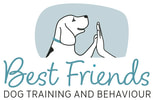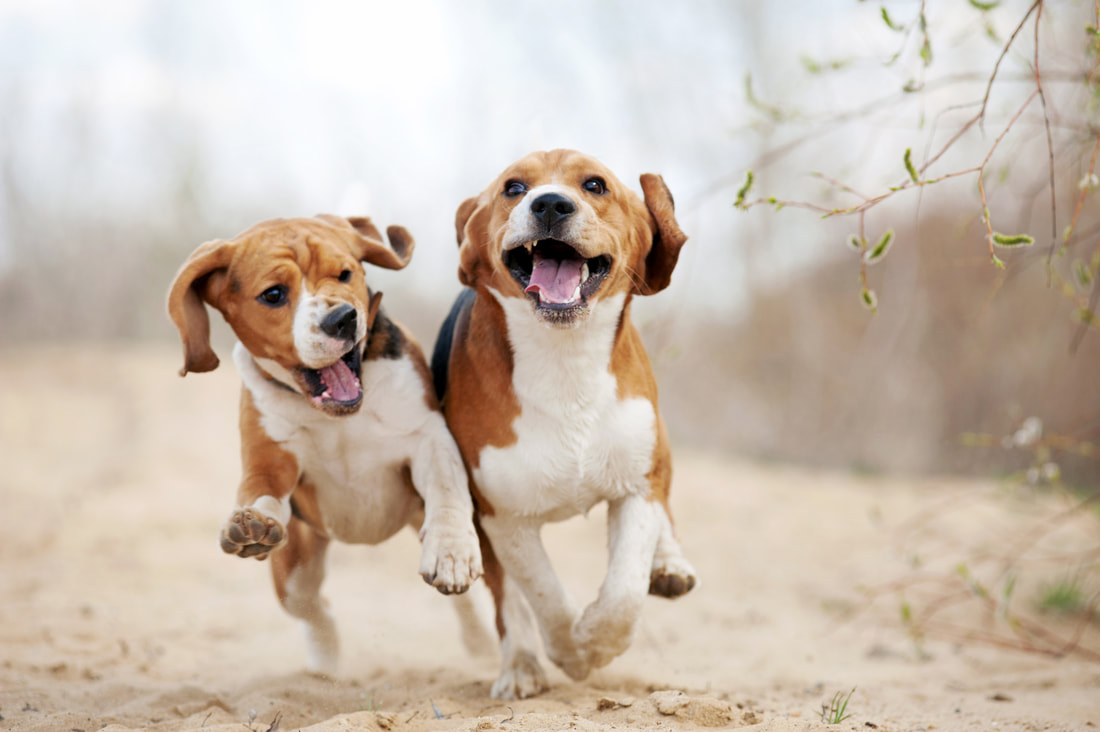SOCIALIZING WITH DOGS: Puppies have to learn how to be a dog with other dogs. There are some natural tendencies but without a chance to learn, dogs do not automatically become skilled at interacting with other dogs.
Dog socialization occurs throughout your dog's life but, typically, most dog-dog socialization occurs in the dog's first two years. Dogs need these early opportunities to learn how to interact with other dogs. Otherwise, they may be afraid, reactive or even aggressive towards dogs they don't know. This may, in large part, be due to simply not knowing what to do.
Your dog needs to know how to be a courteous member of canine society and when and how to interact with other dogs. Your dog also needs to know how to remain calm and be able to work with people even in the presence of other dogs.
The first half of the socialization period begins around 4 weeks. Of course dog-dog socialization begins at birth when a caring mother and litteramates provided warmth, touch, stimulation, contact and interaction. From an appropriate mother with good skills, puppies learn the beginnings of bite inhitibiton and self control, along with the concept of NO.
From 8 – 16 weeks your puppy is learning about relationships. He will continue to learn throughout his life but he will never learn as much and as fast as he does in this socialization period. This is one of the reasons your puppy will benefit from a good puppy kindergarten class – to make the most of this amazing learning phase and put puppies of similar ages together to learn from each other.
When he is with other dogs, your puppy is learning to read their body language. Other dogs behave, look, sound and play differently. He learns what NO means when other dogs say it to him with their body posture, their eyes, their gestures, and even with growls and other warnings. He also learns what YES looks like when other dogs invite him to play.
Your puppy learns bite inhibition from other puppies. He learns to be careful when using his sharp puppy teeth. If he bites too hard, his playmate may decide to retaliate or simply walk away. In every encounter, your puppy is enhancing his understanding of how to use his teeth and jaw power appropriately without hurting others. Playtime with a wide variety of dogs helps him learn that he needs to adjust his behaviour to different playmates.
Socialization with other dogs begins at birth and needs to continue right up to adulthood, around 2 years. With each developmental stage, you may see your puppy change how he interacts with other dogs. Really young puppies are mostly interested in play and exploration while older pups can be interested other aspects of relationships. Learning how to be a polite member of canine society requires lots of practice!
Politeness and respect for other dogs’ space, possessions, and food, as well as learning to share, helps prevent conflict. Fun games happen as the pup learns to start, control, and even end play sessions. There is a lot to learn!
Puppies benefit from off leash socialization opportunities with safe and appropriate playmates. There is a limit to what a puppy can learn about dog=dog relationships on leash. Have your pup meet as many friendly dogs as possible of different sizes, shapes, colours, breeds, ages, and both genders. Dogs not only look different but have different body language and play styles as well.
Be careful about introducing your pup to other dogs. Not all dogs are good with puppies who are not old enough to be socially skilled. Even a well socialized dog with many dog friends can be alarmed, annoyed or even afraid of a puppy. The puppy’s lack of social skills can trigger some dogs who may react with frightening snarls, barks or bites. Remember that pups under four months are in a sensitive developmental stage and any bad experiences at this time may stick with them for life. Make sure you only introduce your pup to known, safe dogs.
Dog socialization occurs throughout your dog's life but, typically, most dog-dog socialization occurs in the dog's first two years. Dogs need these early opportunities to learn how to interact with other dogs. Otherwise, they may be afraid, reactive or even aggressive towards dogs they don't know. This may, in large part, be due to simply not knowing what to do.
Your dog needs to know how to be a courteous member of canine society and when and how to interact with other dogs. Your dog also needs to know how to remain calm and be able to work with people even in the presence of other dogs.
The first half of the socialization period begins around 4 weeks. Of course dog-dog socialization begins at birth when a caring mother and litteramates provided warmth, touch, stimulation, contact and interaction. From an appropriate mother with good skills, puppies learn the beginnings of bite inhitibiton and self control, along with the concept of NO.
From 8 – 16 weeks your puppy is learning about relationships. He will continue to learn throughout his life but he will never learn as much and as fast as he does in this socialization period. This is one of the reasons your puppy will benefit from a good puppy kindergarten class – to make the most of this amazing learning phase and put puppies of similar ages together to learn from each other.
When he is with other dogs, your puppy is learning to read their body language. Other dogs behave, look, sound and play differently. He learns what NO means when other dogs say it to him with their body posture, their eyes, their gestures, and even with growls and other warnings. He also learns what YES looks like when other dogs invite him to play.
Your puppy learns bite inhibition from other puppies. He learns to be careful when using his sharp puppy teeth. If he bites too hard, his playmate may decide to retaliate or simply walk away. In every encounter, your puppy is enhancing his understanding of how to use his teeth and jaw power appropriately without hurting others. Playtime with a wide variety of dogs helps him learn that he needs to adjust his behaviour to different playmates.
Socialization with other dogs begins at birth and needs to continue right up to adulthood, around 2 years. With each developmental stage, you may see your puppy change how he interacts with other dogs. Really young puppies are mostly interested in play and exploration while older pups can be interested other aspects of relationships. Learning how to be a polite member of canine society requires lots of practice!
Politeness and respect for other dogs’ space, possessions, and food, as well as learning to share, helps prevent conflict. Fun games happen as the pup learns to start, control, and even end play sessions. There is a lot to learn!
Puppies benefit from off leash socialization opportunities with safe and appropriate playmates. There is a limit to what a puppy can learn about dog=dog relationships on leash. Have your pup meet as many friendly dogs as possible of different sizes, shapes, colours, breeds, ages, and both genders. Dogs not only look different but have different body language and play styles as well.
Be careful about introducing your pup to other dogs. Not all dogs are good with puppies who are not old enough to be socially skilled. Even a well socialized dog with many dog friends can be alarmed, annoyed or even afraid of a puppy. The puppy’s lack of social skills can trigger some dogs who may react with frightening snarls, barks or bites. Remember that pups under four months are in a sensitive developmental stage and any bad experiences at this time may stick with them for life. Make sure you only introduce your pup to known, safe dogs.


